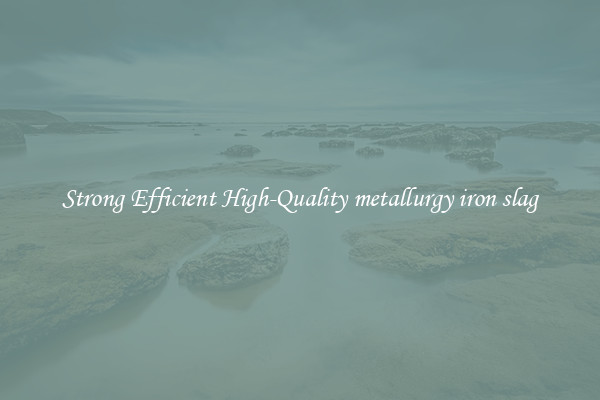Strong Efficient High-Quality metallurgy iron slag
Metallurgy Iron Slag: The Strong, Efficient, and High-Quality Material

Iron slag has been widely used in various industries, including construction, road building, and agriculture, due to its remarkable properties and versatility. With its strong and efficient characteristics, and the ability to produce high-quality materials, iron slag has become a valuable resource in different applications.
One of the primary advantages of iron slag is its exceptional strength. When combined with other materials, such as cement or asphalt, iron slag can enhance the overall durability and load-bearing capacity of structures, making them more resistant to heavy loads, extreme weather conditions, and seismic activities. This strength is particularly beneficial in road construction, as it ensures the longevity and stability of the pavement, reducing maintenance costs in the long run.
Additionally, iron slag is known for its efficiency in resource management. The utilization of iron slag helps conserve natural resources by reducing the need for virgin materials, such as limestone or gravel, in the production of concrete. By replacing a portion of these materials with iron slag, the demand for mining and extraction is significantly decreased, resulting in reduced environmental impact and conservation of resources for future generations.
Moreover, iron slag plays a crucial role in enhancing the quality of construction materials. When used as an additive in cement production, iron slag improves the compressive strength, chemical resistance, and overall performance of the final product. It also contributes to reducing the heat of hydration, making the concrete more resistant to cracking and enhancing its workability during the construction process.
In the agricultural sector, iron slag has proven to be an efficient and sustainable solution. Its use as a soil amendment can improve soil fertility, enhance water retention capacity, and provide essential nutrients to plants. Iron slag is rich in iron, calcium, and other micronutrients, making it beneficial for soil conditioning and correcting nutrient deficiencies. The addition of iron slag to agricultural land helps promote healthy plant growth, increase crop yields, and reduce the reliance on chemical fertilizers.
Furthermore, the recycling of iron slag in metallurgical processes improves the overall energy efficiency of the iron and steel industry. The incorporation of iron slag back into the production cycle not only reduces waste generation but also saves energy by utilizing the heat and chemical potential of the slag. By optimizing the use of iron slag, the industry can minimize its environmental footprint and contribute to a more sustainable future.
In conclusion, iron slag is a strong, efficient, and high-quality material that offers numerous advantages across different industries. Its exceptional strength, resource efficiency, and ability to enhance the quality of construction materials make it an invaluable resource in the modern world. Moreover, its applications in agriculture and metallurgy contribute to sustainability and energy conservation. By harnessing the potential of iron slag, industries can achieve economic, environmental, and social benefits, paving the way for a more sustainable and efficient future.

View details

View details

View details

View details








